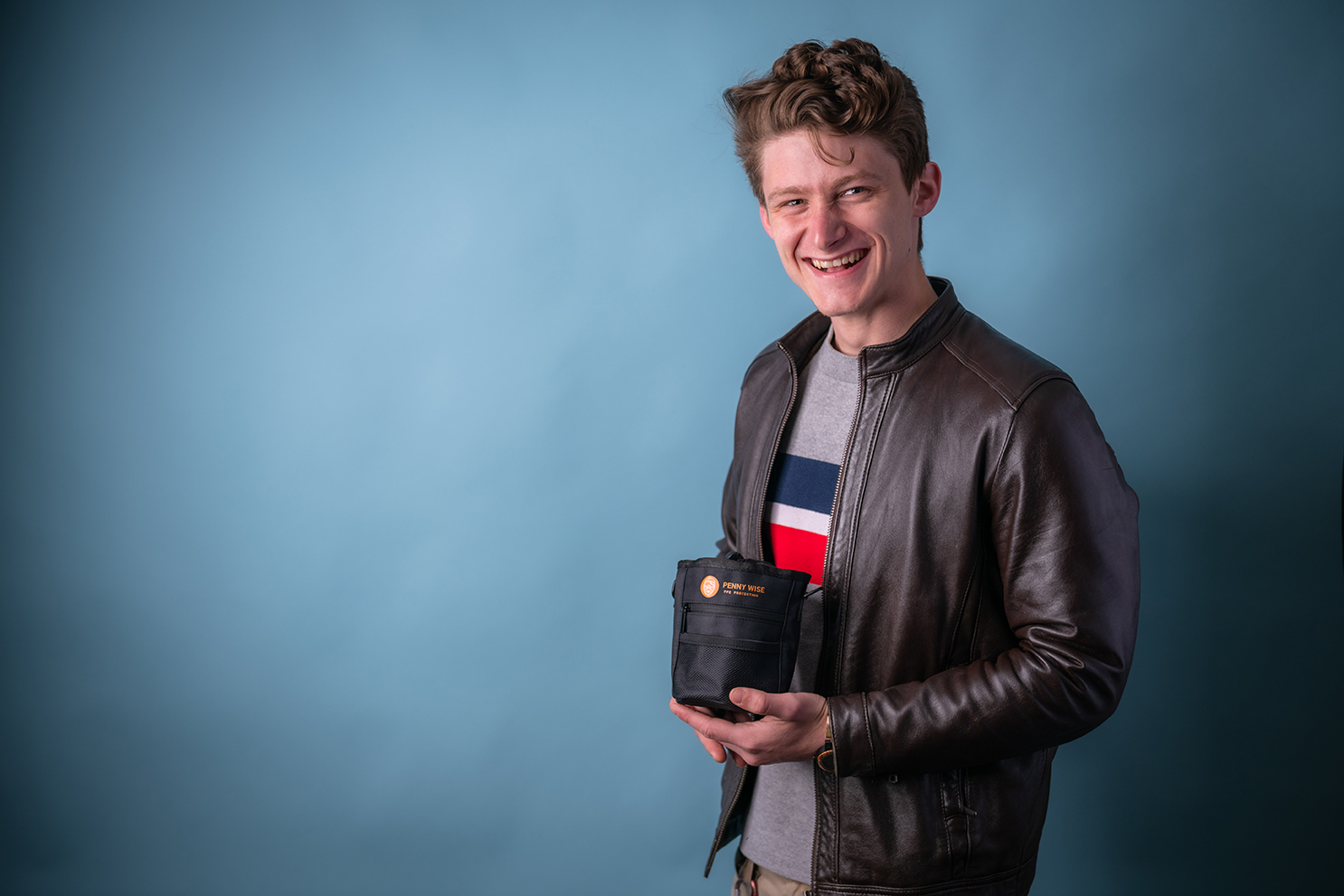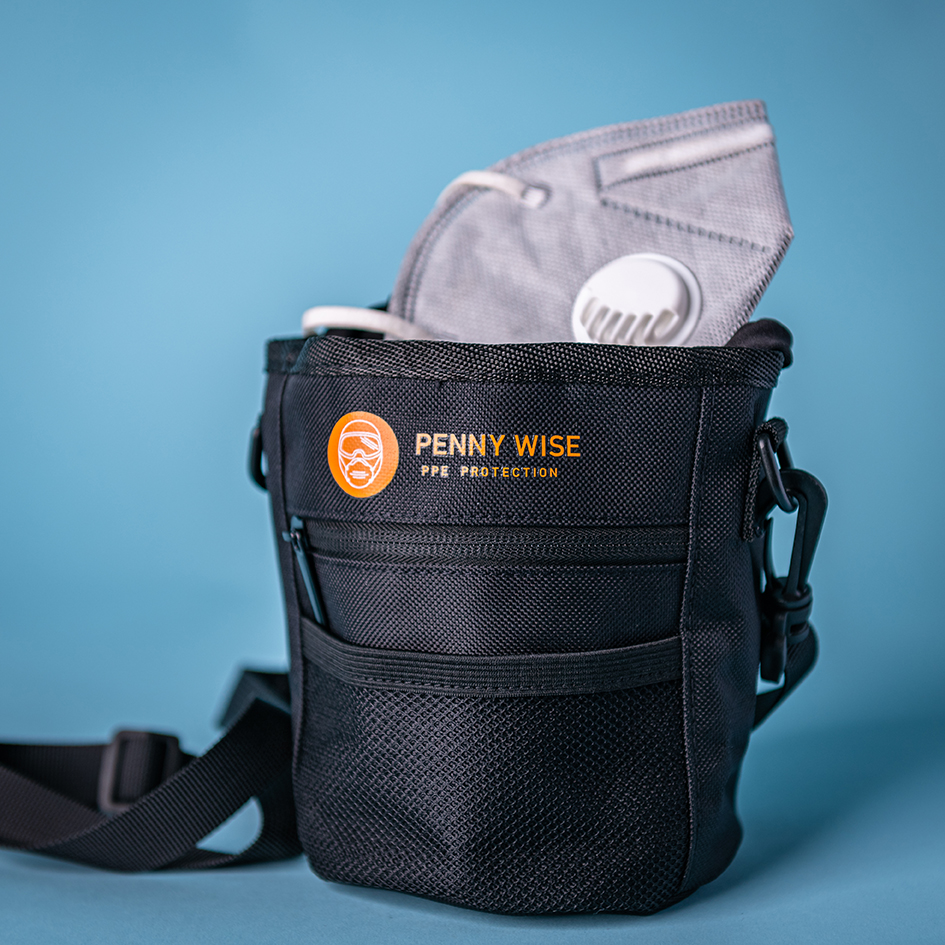Student entrepreneur Ethan Lutz ’21 earns top award at 2021 Ureka Challenge

Civilizations across the globe have recognized the antimicrobial properties of copper — from the ancient Pheonicians’ use of copper to sterilize their wounds after battle to the practice of Ayurvedic medicine in India, which recommends using copper vessels to purify drinking water. Recognizing these benefits, Clark University student Ethan Lutz ’21 — a political science major and biochemistry and molecular biology minor — drew upon his background in science and emergency medicine to invent a copper-lined PPE (personal protective equipment) storage bag that helps health care workers keep their equipment sanitized.
Lutz’s venture recently earned him the $4,000 first-place Judges’ Award during Clark University’s 2021 Ureka Challenge — a months-long annual event designed to promote, develop, and grow Clark’s student ventures. The CopperClean Bag produced by Lutz’s company, Penny Wise PPE Protection, features a germicidal copper lining that prevents cross-contamination by destroying bacteria and viruses on contact.
“My education in biochemistry and molecular biology led to lots of discussions about bacteria and viruses — how they’re disrupted and things that can inhibit them,” Lutz says. “Copper releases ions that rupture the viral capsules of viruses and the membranes of bacteria, a process called the oligodynamic effect. Understanding the chemistry behind how those substances are made has allowed me to do the manufacturing work on my own.”
Lutz first developed the idea for Penny Wise PPE Protection while deployed to New York City as an EMT under a Federal Emergency Management Agency contract during the peak of the pandemic last spring. There, he and other health care professionals were instructed to store their PPE in brown paper bags between calls — a common practice that Lutz says can transfer the virus back onto the inside of masks, potentially infecting providers.
“Not only does this cross-contamination put the provider at risk of contracting COVID-19 unnecessarily, but it also lowers the lifespan of PPE and causes institutions and health care facilities to spend more on PPE costs than they would have otherwise,” he says.

Lutz worked with his mother, who is a physician, to develop a prototype for the CopperClean Bag while he was deployed, using a dog treat bag lined with copper foil to store his gear. He then finalized the design using an 88 percent copper polyester fabric and filed patent and trademark information for the product while he was still in New York City.
Lutz now plans to expand Penny Wise PPE Protection to offer a number of new products, including copper-infused surgical and N95 masks, copper-lined purses, and odor-eliminating sports accessories like duffle bags and shoe soles, using money from the Ureka Challenge to help develop and launch the products.
“We’re really hoping to diversify our product launch and make Penny Wise a viable company post COVID,” he says.
The marketing and financial experience he gained through the Ureka Challenge was integral to getting his business off the ground, Lutz says. Students with entrepreneurial aspirations apply to the challenge in mid-October and accepted ventures are awarded $100 of investment seed money. Over the course of several months, participants receive mentorship from faculty, alumni, and successful entrepreneurs, and market their products though Clark Collective-sponsored pop-ups, crowdfunding events, and other venture development activities.
The process concludes with Ureka participants presenting their small businesses to a panel of judges comprising alumni, staff, faculty, and past Ureka winners for a chance to receive as much as $5,000 in funding. This year’s presentations were held virtually and featured 17 students representing 15 ventures.
“It was absolutely a learning opportunity,” Lutz says. “One of the things I value about my Clark education is that it has been so multi-faceted.”
Lutz’s participation in the challenge and his work in New York City have also inspired him to adjust his career goals. He’d planned to attend medical school after graduation, but he now wants to grow his company while working as an EMT in Worcester.
“This experience and this year have been eye-opening,” he says. “It’s a testament to what Clark is trying to do — not pump out generic cogs in a machine but create holistic, well-rounded individuals who are going to change the world.”
This year’s Ureka Challenge awards went to:
Judges’ Awards
Ethan Lutz ’21, Penny Wise PPE Protection – 1st place, $4,000
Gari De Ramos ’21, Radical in Progress – 2nd place, $3,000
Julia Dantzler ’24, No Worries Skincare- 3rd place, $2,500
Martina Villanueva ’23, Magpies Collect – $1,700 from judges
Victoria Pastor ’24, Self-Care with Vi – $1,500 from judges
Lucy Barrett ’21, Worcester Free Fridge – $1,000 from judges
Charisma Nguyen-Lai ’22, Charied Away – $1,000 from judges
Melanie Adams ’22, Empower Yoga Project – $800 from judges
Da’Vyana Williams ’24, Economically Girly – $500 from judges
Ureka Committee Favorite Awards
Martina Villanueva ’23, Magpies Collect – $500
Madeline Steigman ’24, Dough is Me – $500
Crowd Funding Awards
Jens Peterson ’24, What We Leave – 1st place, $1,500
Tsanta Rakotoarisoa ’21 and Wuzhenjun Xue ’21, Tsara & Soa – 2nd, place, $1,000
Madeline Steigman ’24, Dough is Me – 3rd place, $500


